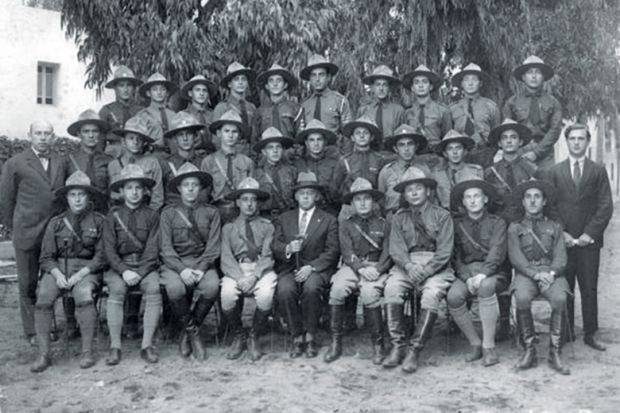On New Year’s Day 1929, in one of Europe’s great capital cities, and to the sound of trumpets and drums, hundreds of young people in uniform marched to an imposing place of worship, there to listen to a sermon extolling the many virtues of the organisation to which they belonged. At the conclusion of these ceremonies the many journalists present filed their stories. One noted that “Astonished, Jewish Warsaw watched the parade of Jewish fascists across the city.” Another referred to the leader of the organisation as a “Jewish Mussolini”, and to the heavily choreographed march in which they had participated (to Warsaw’s Great Synagogue) as “their March on Rome”. The organisation in question was known as Betar, and its leader was the Jewish soldier, orator and poet Vladimir Jabotinsky.
The event that so enraptured some Jews, but which angered so many more, was the opening ceremony of Betar’s first international conference. Betar was the name of the last Jewish fortress to hold out against the Romans in 136 CE. But it was also a Hebrew acronym – Brit Yosef Trumpeldor – referring to Joseph Trumpeldor, a close friend of Jabotinsky, who had been murdered by Palestinian Arabs at Tel Hai, in what became Mandate Palestine, in 1920.
Betar was founded by Jabotinsky in Riga, Latvia, in 1923, and from then until his death in New York 17 years later it served as a powerful weapon that he hoped would assist him in wresting control of the world Zionist movement from a leadership that he and his “Revisionist” followers regarded as far too accommodating to the British and in any case dangerously moderate.
Jabotinsky was no moderate. But was he a fascist, and was Betar really a collection of genuine Jewish fascists? These are questions that Daniel Kupfert Heller has set out to answer in a meticulously researched and elegantly crafted monograph, not the least virtue of which is its deep mining of sources in several languages across several continents.
As Heller admits, the answers depend in part on how one defines fascism. Members of Betar were certainly instilled with the cult of the leader (Jabotinsky) and with the supreme virtue of sacrifice for the greater good. Betar was – or at least became – militaristic in outlook, sometimes violently so. But while at times severely autocratic, Jabotinsky was at heart a democrat, and if we find this apparent contradiction almost too much to swallow, it’s as well to remember that during the 1920s even stalwarts of the British Labour Party could be heard muttering that a future Labour-controlled Parliament might be persuaded to pass enabling legislation giving sweeping powers to a socialist government.
Betar – in short – was a child of its time, and at that particular time Poland, from which it largely recruited, was home to 3 million Jews who were subject to daily harassment, economic and educational boycott and gratuitous violence – all at the behest of Catholic extremists and their government cheerleaders. Jabotinsky’s answer was to meet violence with violence and even to instigate attack as the surest means of defence.
Had he been listened to, many more Jews might be alive now.
Geoffrey Alderman is a senior research fellow at the Institute of Historical Research, University of London, working on a book about the Jewish contribution to crime in the UK since Cromwell.
Jabotinsky’s Children: Polish Jews and the Rise of Right-Wing Zionism
By Daniel Kupfert Heller
Princeton University Press
352pp, £27.95
ISBN 9780691174754
Published 12 September 2017
Register to continue
Why register?
- Registration is free and only takes a moment
- Once registered, you can read 3 articles a month
- Sign up for our newsletter
Subscribe
Or subscribe for unlimited access to:
- Unlimited access to news, views, insights & reviews
- Digital editions
- Digital access to THE’s university and college rankings analysis
Already registered or a current subscriber?




